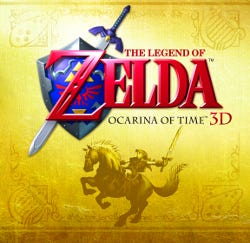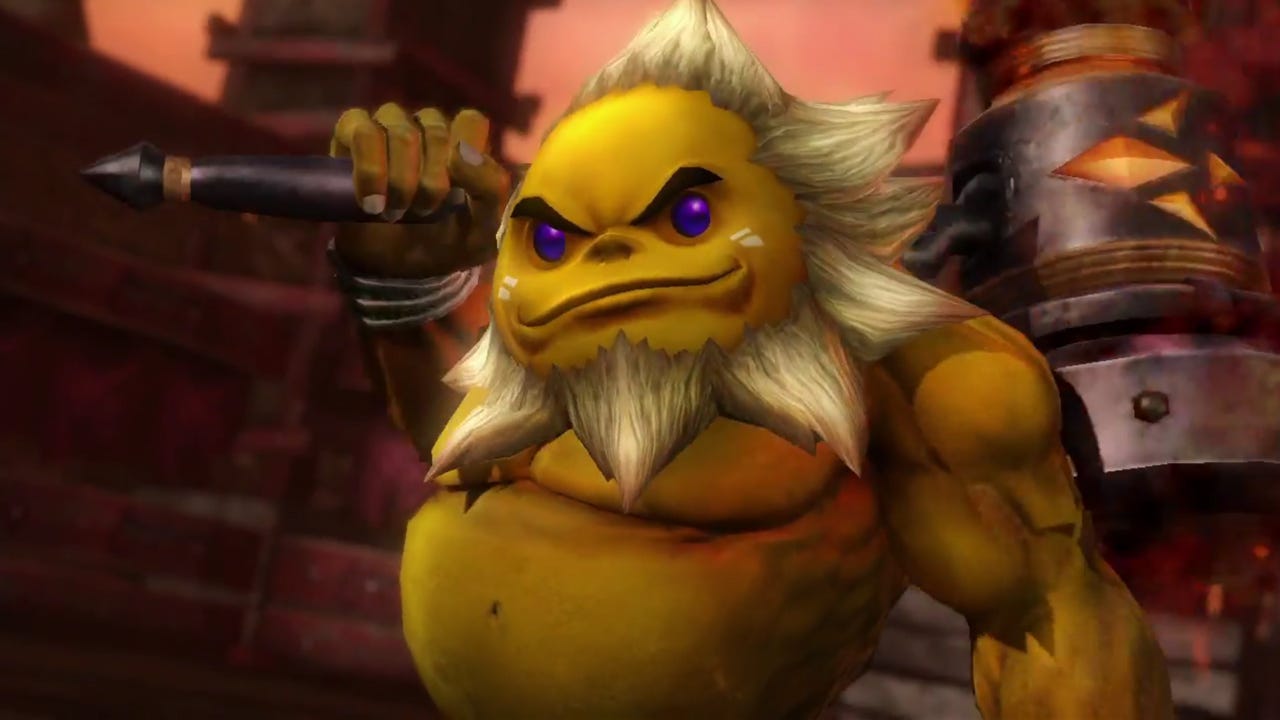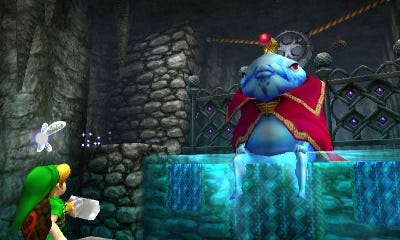Alright dear reader, I apologize for the miserable title, I do. But OoT is a difficult game for me to write about. Somehow I feel the weight and breadth of the series bearing down on me when I consider it and the millions of words written before for me in my experience of the game. In fact, one of the things I am bringing to the table today is that self-same experience.
As this series continues to ebb and flow, I find myself at odds with the context of a game and the existing discourse surrounding it--that I cannot escape my knowing culpability as someone who has merely heard about Zelda or Ocarina for the past 20 years of my life. In many ways, this feeling of responsibility and context has begun to shape my thesis--if I should even have one. When visiting a game or any media, truly, we are a functional bit in the cultural memory of that experience--shaped by all the bits of memory and thought that preceded our moment and thus predefined it. Sure, we can enter into a discourse without knowledge, understanding, or expectation, but for something as monumental as Ocarina is it really possible to the avoid the many hundreds of hours of thought recorded on youtube regarding the game? All said, Ocarina is an incredible and fantastic game that is easy to love and poignantly beautiful in its execution. However, I did feel like I was doing homework more often than not; maybe a function of my project more than anything else.
I played the 3DS version and would highly recommend it.
The Game & Such
HERE THERE BE SPOILERS AFOOT
What should immediately stand out to anyone approaching Ocarina is its brazen charm. Sweet, fun, and evocative, Ocarina quickly wins over players immediately in aesthetics and sticks them with dungeon delving and puzzle solving. And yet, I so often chaffed with Adult Link and the seeming tedium of being in a world that resents your very presence. Especially compared to world like Majora's, beautiful and terrible in its tragically terminal storytelling. And, yes, I know the whole world doesn’t resent your presence—you the titular hero of time here to save the world from Ganondorf’’s miserly power. But the world is not here for you, you are here for the world, put simply. This is why Zelda gifts you your childhood back at the end of the game, I submit.
Moreover, the child so desperate to be an adult they take on tasks and burdens beyond themselves.
Ocarina is a bit of a fever dream wrapped in a myth I hardly remember from my childhood--it’s succinct, truly, in execution and flow. The gameplay is fun, the story telling straightforward, and the characters fleshed out and endearing. Maybe its the characters and plot that kept me engaged, but I so loved how well it captured the feeling of being an outsider in communities not made for you. Link consistently fights for his place and role in the world, first as the child without a faerie, then again as the adult out of time. The heart and gumption of seeing this somewhat foreign, yet familiar dreamspace of Hyrule and its accompanying zones begs you to make yourself useful, giving the player choice, clues, and multiple directions to chase, Despite this, each area demands you make yourself worthy of their time or attention before you can proceed or be welcomed. Consider, if you will, Dodongo's Cavern and the Goron.
As a child, Link finds a mountain full of people who eat rocks and roll like boulders through their space—a capsule of wonder. Yet, as a kid from the woods nearby, Link could not be more out of place; an outsider looking in and in search of an item religiously relevant to the Goron. In spite of his quest, Link is merely requested to free the cavern and earn the gem in his own right through combat and mettle. But in doing so, he will earn the right to belong to the Gorons and even become Darunia's brother. Perhaps I'm being too academic and harsh. Darunia asks you to play a song for him and he dances for you in return; always an even exchange. Darunia even offers the spiritual gem to help him fix the nearby Cavern, yet I cannot help the feeling that everywhere Link goes he is a tool to solve a problem. A hammer for every so-called nail, and as such, he drifts through spaces not his own, until he is proven worthy. In this way, Link is a hammer that must earn their right to even be considered. Moreover, the child so desperate to be an adult they take on tasks and burdens beyond themselves.
Ocarina is a story interested in exploring what it means to grow and fit into a community space as an intrinsic outsider. It's a story looking out from child eyes in a world that looks back with contempt and suspicion, but also the beauty and wonder (and terror) of childhood. These moments as a child are so brilliant and succinct despite their brevity. Yet, this is often the feeling of a child isn’t it? To dream and wish and vainly grasp at the power and status that comes with age despite its unknowable foibles. Here, as the child hero, Link fights for that consideration exactly, while also chasing after his lost princess Zelda.
For me, the experience of Ocarina is just that—the exploration of this intrepid childhood experience of seeking to the be the adult and considered as such. Maybe I am reading my own imposter syndrome into it a bit, but the similarities or perhaps the trajectory of that childhood feeling seems direct. As if the desire to be the adult must lead directly to the feelings of imposterhood that many of my contemporaries share today. Myself included. And yet how foolish it is to seek the boiling responsibilities of adulthood; to miss the essence of carefree wonderment that childhood alone offers. But Zelda fixes that for Link, doesn’t she? At the end of the adventure and the terrible tragedies that befell Hyrule, Zelda gives Link his childhood back, sends him back 7 years, and lets him have what he missed for all those years, but with the knowledge he gained during the war with Ganondorf. Truly, a miracle to behold.
That is until you pick up the sequel, Majora’s Mask and see that Link’s direct follow up is a quest to saving a dying, termina
l land that better represents Link’s inability to actually recapture that childhood whimsy. Again, I struggle to find my place in the discourse of Ocarina because, precisely, its such a magnificent work that means so much to so many. As such, I’ll leave it here.
Ocarina is an incredible experience and beautiful game to behold. So much of its design philosophy echoes throughout games today—from choice-based game design in Dark Souls or exploration design in Breath of the Wild or even Horizon Zero Dawn. If you haven’t played it, try it out until you become an adult and do another dungeon. It’s worth it, even when it shows its age (which isn’t often).
Thanks for joining me as I transition to Substack and looking forward to a fresh start on Use Your Items!






You might think that its difficult to find a unique voice or thesis, but you don't have to create someone new for everyone, just something new for one person. I find the following paragraph:
Ocarina is a story interested in exploring what it means to grow and fit into a community space as an intrinsic outsider. [...] Here, as the child hero, Link fights for that consideration exactly, while also chasing after his lost princess Zelda.
To be an excellent thesis that I seldom hear about, and never heard put in such words eloquently. Don't get too lost in the sauce! Sometimes, it's already great :)
As much as I love OoT I've always taken it at face value and never really considered the deeper meanings. Most of if not all of my experiences with Ocarina has been from borrowing/renting the game or watching a friend's older brother play it.
You make me want to charge up my 3DS and give this game a real honest crack at actually completing it.